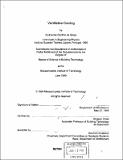Ventilative cooling
Author(s)
Graça, Guilherme Carrilho da, 1972-
DownloadFull printable version (13.08Mb)
Other Contributors
Massachusetts Institute of Technology. Dept. of Architecture.
Advisor
Qingyan Chen.
Terms of use
Metadata
Show full item recordAbstract
This thesis evaluates the performance of daytime and nighttime passive ventilation cooling strategies for Beijing, Shanghai and Tokyo. A new simulation method for cross-ventilated wind driven airflow is presented . This method decouples the airflow model from the thermal model allowing for fast real weather simulation of the building thermal performance. The simulation is performed on a six-story, isolated, suburban apartment building, considered to be typical of the three cities. The performance of the two natural ventilation strategies on this building is compared . The impact on the performance of different types of construction is assessed for the night cooling ventilation strategy. The results show that night cooling is superior to daytime ventilative cooling in the three cities. Night cooling can successfully replace air conditioning systems for a significant part of the cooling season in Beijing and Tokyo. For Shanghai, neither of the two passive ventilation systems can be considered successful. In both Beijing and Tokyo the application of night cooling may cause condensation in partitions. The use of heavyweight partitions does not show a noticeable improvement over normal construction (using 10cm concrete partitions) . On the other hand, the lightweight case shows a noticeable degradation in system performance. Therefore, the normal structural system is the best option. The use of carpet has a very negative impact on night cooling performance, and is therefore not advised.
Description
Thesis (S.M.)--Massachusetts Institute of Technology, Dept. of Architecture, 1999. Includes bibliographical references (p. 131-134).
Date issued
1999Department
Massachusetts Institute of Technology. Department of ArchitecturePublisher
Massachusetts Institute of Technology
Keywords
Architecture.